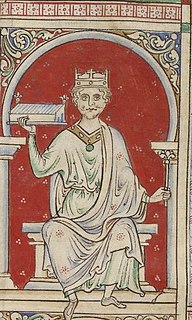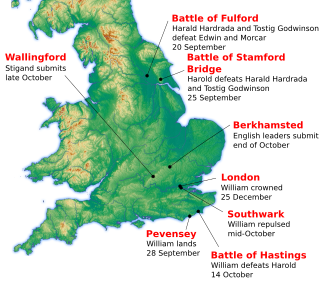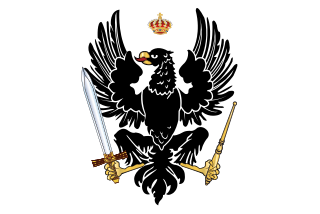This article relies largely or entirely on a single source .(September 2019) |
William de Pembroke was Archdeacon of Totnes in England during 1263. [1]
This article relies largely or entirely on a single source .(September 2019) |
William de Pembroke was Archdeacon of Totnes in England during 1263. [1]

Mary II was Queen of England, Scotland, and Ireland, co-reigning with her husband, King William III & II, from 1689 until her death from smallpox at age 32. Popular histories usually refer to their joint reign as that of William and Mary.

William Shakespeare was an English playwright, poet, and actor, widely regarded as the greatest writer in the English language and the world's greatest dramatist. He is often called England's national poet and the "Bard of Avon". His extant works, including collaborations, consist of some 39 plays, 154 sonnets, two long narrative poems, and a few other verses, some of uncertain authorship. His plays have been translated into every major living language and are performed more often than those of any other playwright. They also continue to be studied and reinterpreted.

William Blake was an English poet, painter, and printmaker. Largely unrecognised during his lifetime, Blake is now considered a seminal figure in the history of the poetry and visual arts of the Romantic Age. What he called his prophetic works were said by 20th-century critic Northrop Frye to form "what is in proportion to its merits the least read body of poetry in the English language". His visual artistry led 21st-century critic Jonathan Jones to proclaim him "far and away the greatest artist Britain has ever produced". In 2002, Blake was placed at number 38 in the BBC's poll of the 100 Greatest Britons. While he lived in London his entire life, except for three years spent in Felpham, he produced a diverse and symbolically rich œuvre, which embraced the imagination as "the body of God" or "human existence itself".

William Henry Harrison was an American military officer and politician who served as the ninth president of the United States in 1841. He died of either typhoid, pneumonia, or paratyphoid fever 31 days into his term, becoming the first president to die in office and the shortest-serving U.S. president in history. His death sparked a brief constitutional crisis regarding succession to the presidency, because the Constitution was unclear as to whether Vice President John Tyler should assume the office of president or merely execute the duties of the vacant office. Tyler claimed a constitutional mandate to become the new president and took the presidential oath of office, setting an important precedent for an orderly transfer of the presidency and its full powers when the previous president fails to complete the elected term.

William Howard Taft was the 27th president of the United States (1909–1913) and the tenth Chief Justice of the United States (1921–1930), the only person to have held both offices. Taft was elected president in 1908, the chosen successor of Theodore Roosevelt, but was defeated for re-election by Woodrow Wilson in 1912 after Roosevelt split the Republican vote by running as a third-party candidate. In 1921, President Warren G. Harding appointed Taft to be chief justice, a position in which he served until a month before his death.

Sir William Wallace was a Scottish knight who became one of the main leaders during the First War of Scottish Independence.
William I, usually known as William the Conqueror and sometimes William the Bastard, was the first Norman King of England, reigning from 1066 until his death in 1087. He was a descendant of Rollo and was Duke of Normandy from 1035 onward. His hold was secure on Normandy by 1060, following a long struggle to establish his throne, and he launched the Norman conquest of England six years later. The rest of his life was marked by struggles to consolidate his hold over England and his continental lands, and by difficulties with his eldest son, Robert Curthose.

William II, the third son of William the Conqueror, was King of England from 26 September 1087 until 2 August 1100, with powers over Normandy, and influence in Scotland. He was less successful in extending control into Wales. William is commonly referred to as William Rufus, perhaps because of his ruddy appearance or, more likely, due to having red hair as a child that grew out in later life.

William Wordsworth was an English Romantic poet who, with Samuel Taylor Coleridge, helped to launch the Romantic Age in English literature with their joint publication Lyrical Ballads (1798).

William IV was King of the United Kingdom of Great Britain and Ireland and King of Hanover from 26 June 1830 until his death in 1837. The third son of George III, William succeeded his elder brother George IV, becoming the last king and penultimate monarch of Britain's House of Hanover.

The Battle of Hastings was fought on 14 October 1066 between the Norman-French army of William, the Duke of Normandy, and an English army under the Anglo-Saxon King Harold Godwinson, beginning the Norman conquest of England. It took place approximately 7 miles northwest of Hastings, close to the present-day town of Battle, East Sussex, and was a decisive Norman victory.

William III, also widely known as William of Orange, was sovereign Prince of Orange from birth, Stadtholder of Holland, Zeeland, Utrecht, Guelders and Overijssel in the Dutch Republic from the 1670s and King of England, Ireland and Scotland from 1689 until his death. As King of Scotland, he is known as William II. He is sometimes informally known as "King Billy" in Ireland and Scotland. His victory at the Battle of the Boyne in 1690 is commemorated by unionists, who display orange colours in his honour. Popular histories usually refer to his joint reign with his wife, Queen Mary II, as that of William and Mary.

The Norman conquest of England was the 11th-century invasion and occupation of England by an army made up of Normans, Bretons, Flemish, and men from other French provinces, all led by the Duke of Normandy later styled William the Conqueror.

Prince William, Duke of Cambridge, is a member of the British royal family. He is the elder son of Charles, Prince of Wales, and Diana, Princess of Wales. Since birth, he has been second in the line of succession to the British throne.

The College of William & Mary is a public research university in Williamsburg, Virginia. Founded in 1693 by letters patent issued by King William III and Queen Mary II, it is the second-oldest institution of higher education in the United States, after Harvard University.

The Kingdom of Prussia was a German kingdom that constituted the state of Prussia between 1701 and 1918. It was the driving force behind the unification of Germany in 1871 and was the leading state of the German Empire until its dissolution in 1918. Although it took its name from the region called Prussia, it was based in the Margraviate of Brandenburg. Its capital was Berlin.

Catherine, Duchess of Cambridge,, is a member of the British royal family. Her husband, Prince William, Duke of Cambridge, is second in the line of succession to the British throne, making Catherine a likely future queen consort.

William Pelham Barr is an American attorney who served as the 77th and 85th United States Attorney General, in the administrations of Presidents George H. W. Bush and Donald Trump.

William Shatner, sometimes known as Bill Shatner to friends and colleagues, is a Canadian actor, author, producer, director, screenwriter, and singer. In his seven decades of acting, Shatner became a cultural icon for his portrayal of Captain James T. Kirk of the USS Enterprise in the Star Trek franchise. He has written a series of books chronicling his experiences playing Captain Kirk, being a part of Star Trek, and life after Star Trek. Shatner has also co-written several novels set in the Star Trek universe, and a series of science fiction novels called TekWar, that were adapted for television.
| This article about a Church of England archdeacon in the Province of Canterbury is a stub. You can help Wikipedia by expanding it. |